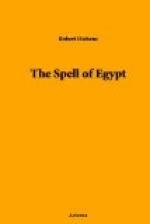How can one disentangle from their tapestry web the different threads of a spell? And even if one could, if one could hold them up, and explain, “The cause of the spell is that this comes in contact with this, and that this, which I show you, blends with, fades into, this,” how could it advantage any one? Nothing could be made clearer, nothing be really explained. The ineffable is, and must ever remain, something remote and mysterious.
And so one may say many things of this painted chamber of Philae, and yet never convey, perhaps never really know, the innermost cause of its charm. In it there is obvious beauty of form, and a seizing beauty of color, beauty of sunlight and shadow, of antique association. This turquoise blue is enchanting, and Isis was worshipped here. What has the one to do with the other? Nothing; and yet how much! For is not each of these facts a thread in the tapestry web of the spell? The eyes see the rapture of this very perfect blue. The imagination hears, as if very far off, the solemn chanting of priests and smells the smoke of strange perfumes, and sees the long, aquiline nose and the thin, haughty lips of the goddess. And the color becomes strange to the eyes as well as very lovely, because, perhaps, it was there—it almost certainly was there—when from Constantinople went forth the decree that all Egypt should be Christian; when the priests of the sacred brotherhood of Isis were driven from their temple.
Isis nursing Horus gave way to the Virgin and the Child. But the cycles spin away down “the ringing grooves of change.” From Egypt has passed away that decreed Christianity. Now from the minaret the muezzin cries, and in palm-shaded villages I hear the loud hymns of earnest pilgrims starting on the journey to Mecca. And ever this painted chamber shelters its mystery of poetry, its mystery of charm. And still its marvellous colors are fresh as in the far-off pagan days, and the opening lotus-flowers, and the closed lotus-buds, and the palm and the papyrus, are on the perfect columns. And their intrinsic loveliness, and their freshness, and their age, and the mysteries they have looked on—all these facts are part of the spell that governs us to-day. In Edfu one is enclosed in a wonderful austerity. And one can only worship. In Philae one is wrapped in a radiance of color and one can only dream. For there is coral-pink, and there a wonderful green, “like the green light that lingers in the west,” and there is a blue as deep as the blue of a tropical sea; and there are green-blue and lustrous, ardent red. And the odd fantasy in the coloring, is not that like the fantasy in the temple of a dream? For those who painted these capitals for the greater glory of Isis did not fear to depart from nature, and to their patient worship a blue palm perhaps seemed a rarely sacred thing. And that palm is part of the spell, and the reliefs upon the walls and even the Coptic crosses that are cut into the stone.




